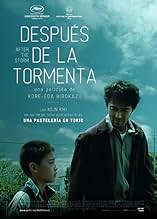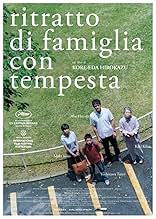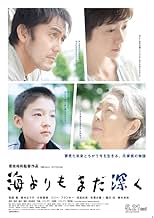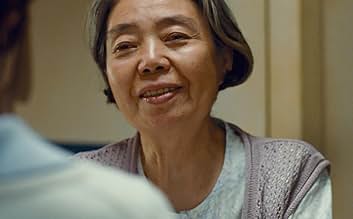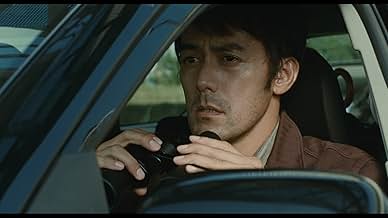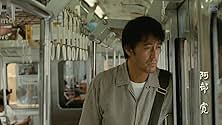NOTE IMDb
7,4/10
14 k
MA NOTE
Après la mort de son père, un détective privé a du mal à payer sa pension alimentaire et à renouer avec son fils et son ex-femme.Après la mort de son père, un détective privé a du mal à payer sa pension alimentaire et à renouer avec son fils et son ex-femme.Après la mort de son père, un détective privé a du mal à payer sa pension alimentaire et à renouer avec son fils et son ex-femme.
- Réalisation
- Scénario
- Casting principal
- Récompenses
- 2 victoires et 13 nominations au total
Avis à la une
There are not many directors whose films I greet with enthusiasm, let alone Japanese ones. I think Hirokazu Koreeda is the only one. His films are a different breed - simple in design, but brilliant in architecture and sublime in closure.
Koreeda is the leading exponent in contemplative cinema. Under his minimalist approach, the essence of familial life and couplehood is distilled into abstract thoughts lingering like warm tendrils wrapped around your mind. The movie may be over but it refuses leave the confines of your consciousness and you would want to surrender to its warm lull again. The tone of After the Storm is pitch-perfect - nobody screams in your face, there are no pointing fingers, no low brow soap-opera. The acting is exquisite and nuanced. What is not said speaks louder than what is uttered. There is humour of the familiar kind; it is the kind of humour you laughed heartily because it is so familiar and you recognise the situations because you have gone through them before. There are not many filmmakers who are as sensitive as Koreeda. Above all else, this is a director who listens to characters' inner thoughts and emotions like an old master piano tuner and he knows how to calibrate the performances for everlasting emotional heft. For Koreeda, it is always about the small moments leading to the big truths.
After the Storm is not one of Koreeda's best films (it needlessly took too long to establish Ryota's character) but it easily transcends way above all the flashy films that inundate our cinemas like ants to candies. I wish I had a notebook last night because some of the metaphors are amazing. Here is one, asseverated by the grandmother Yoshiko, "The longer a stew sits, the more flavour it develops, just like people."
Koreeda is the leading exponent in contemplative cinema. Under his minimalist approach, the essence of familial life and couplehood is distilled into abstract thoughts lingering like warm tendrils wrapped around your mind. The movie may be over but it refuses leave the confines of your consciousness and you would want to surrender to its warm lull again. The tone of After the Storm is pitch-perfect - nobody screams in your face, there are no pointing fingers, no low brow soap-opera. The acting is exquisite and nuanced. What is not said speaks louder than what is uttered. There is humour of the familiar kind; it is the kind of humour you laughed heartily because it is so familiar and you recognise the situations because you have gone through them before. There are not many filmmakers who are as sensitive as Koreeda. Above all else, this is a director who listens to characters' inner thoughts and emotions like an old master piano tuner and he knows how to calibrate the performances for everlasting emotional heft. For Koreeda, it is always about the small moments leading to the big truths.
After the Storm is not one of Koreeda's best films (it needlessly took too long to establish Ryota's character) but it easily transcends way above all the flashy films that inundate our cinemas like ants to candies. I wish I had a notebook last night because some of the metaphors are amazing. Here is one, asseverated by the grandmother Yoshiko, "The longer a stew sits, the more flavour it develops, just like people."
I bet we all can find the shadow of the underachieved protagonist in ourselves, as chances are really slim in materializing one's aspirations in the cruel reality. There he is: down-and-out both in career and mariage, scraping by through blackmailing strangers, yet always managing to squeeze a complacent smile on his face when meeting his family. You would presume he is leading a hopeless, listless, even miserable life, but the means by which the Japanese director narrates the story also attached a rather warm hue to the banal life of the man. In the end, what do we know about life without living it through ourselves?
Kore-eda is a renowned Japanese director for personable family dramas. His work in 'Still Walking' and 'Like Father, Like Son' (although yet to see) prove he is a capable writer when dealing with common family experiences. Marital woes, grief, father and son relationships. The list goes on. This being my first Kore-eda experience, I was unsure which angle to approach this blistering drama with. Regardless, no matter how I set my mind, it was an evocative and multi-layered drama with a masterful level of maturity. A novelist turned private detective, who is struggling for money due to a gambling addiction, coincidentally finds himself stuck at his mother's house overnight when a typhoon hits Japan. At the time the storm hits, his ex-wife and son are also there and spend the night within this claustrophobic environment.
Metaphorically speaking, the typhoon is a vivid representation of the estranged behaviour from both Ryota and Kyoko. Their differences splitting the family apart with such velocity. Yet, there is no hatred. No malice. And that is what I adore about Kore-eda's approach, it doesn't conform to typical clichés. He treats the audience like adults and executes a realistic family drama without needing any overly dramatic plots. Just two characters talking, with personable dialogue that has a surprising amount of wit, attempting to reconcile their differences for the betterment of themselves and their son. The storm acts as plot device for Ryota, allowing him to use the natural disaster to bond with his son. Then, once it subsides, life continues. A profound statement for most families.
Kore-eda explores various areas of urban Japanese culture, especially gambling and poverty, that enables this drama to be multi-layered. But what really cemented his masterful screenplay was just how it personal it was to him. Immediately the characters are bursting with dimensionality, enabling us to invest the time into their stories. Whilst also dealing with the scope of life, by indicating that "grown-ups cannot live only with love". A fascinating character study of a man who's personal ambitions get in the way of living life now. Though the narrative structure is not as fluid as the rain pummelling down from the storm, due to the abrupt transition between the first half before the storm and the second half, it still remains a rigid story.
This is helped by Abe's resourceful performance which was incredibly nuanced. Ryota is a complicated character, and Abe executed his complexions with ease. The late Kiki also gave a noteworthy performance as his mother, offering various lessons on life as she attempts to fix broken bonds within her family. Yamasaki's cinematography was gorgeous, cleanly enveloping you in Japan's natural and urban beauty. Kore-eda also frequently utilised long takes of unedited dialogue exchanges which subconsciously draws you into the drama.
Another small criticism would be the underutilisation of Kyoko's new boyfriend, whom of which could've been used more effectively to display her inner conflict for starting a new family or mending the existing bonds for the sake of her son. Small nitpicks here and there for what is a genuinely mature drama that felt both personal and personable, bolstered by sterling performances and a valuable screenplay. Am excited to see what Kore-eda has in store for us in the future. Oh, and bonus points for showcasing 'Taiko No Tatsujin' (I frickin' love that game...).
Metaphorically speaking, the typhoon is a vivid representation of the estranged behaviour from both Ryota and Kyoko. Their differences splitting the family apart with such velocity. Yet, there is no hatred. No malice. And that is what I adore about Kore-eda's approach, it doesn't conform to typical clichés. He treats the audience like adults and executes a realistic family drama without needing any overly dramatic plots. Just two characters talking, with personable dialogue that has a surprising amount of wit, attempting to reconcile their differences for the betterment of themselves and their son. The storm acts as plot device for Ryota, allowing him to use the natural disaster to bond with his son. Then, once it subsides, life continues. A profound statement for most families.
Kore-eda explores various areas of urban Japanese culture, especially gambling and poverty, that enables this drama to be multi-layered. But what really cemented his masterful screenplay was just how it personal it was to him. Immediately the characters are bursting with dimensionality, enabling us to invest the time into their stories. Whilst also dealing with the scope of life, by indicating that "grown-ups cannot live only with love". A fascinating character study of a man who's personal ambitions get in the way of living life now. Though the narrative structure is not as fluid as the rain pummelling down from the storm, due to the abrupt transition between the first half before the storm and the second half, it still remains a rigid story.
This is helped by Abe's resourceful performance which was incredibly nuanced. Ryota is a complicated character, and Abe executed his complexions with ease. The late Kiki also gave a noteworthy performance as his mother, offering various lessons on life as she attempts to fix broken bonds within her family. Yamasaki's cinematography was gorgeous, cleanly enveloping you in Japan's natural and urban beauty. Kore-eda also frequently utilised long takes of unedited dialogue exchanges which subconsciously draws you into the drama.
Another small criticism would be the underutilisation of Kyoko's new boyfriend, whom of which could've been used more effectively to display her inner conflict for starting a new family or mending the existing bonds for the sake of her son. Small nitpicks here and there for what is a genuinely mature drama that felt both personal and personable, bolstered by sterling performances and a valuable screenplay. Am excited to see what Kore-eda has in store for us in the future. Oh, and bonus points for showcasing 'Taiko No Tatsujin' (I frickin' love that game...).
Fear that your children may mimic your worst qualities is the driving force in Hirokazu Koreeda's ("Our Little Sister") After the Storm (Umi yori mo mada fukaku), a compassionate look at the struggles of a Japanese family. Its title derived from the lyrics of an old pop song, the film is set in Kiyose, a city near Tokyo where it is beautifully shot in the housing compound where Koreeda grew up by cinematographer Yutaka Yamasaki. Ryota Shinoda (Hiroshi Abe, "Everest: The Summit of the Gods") is a novelist who has not had a story published in fifteen years and is forced to work for a private detective agency, which he claims is solely to do research for his next novel. Using his detective job to spy on Kyoko's new boyfriend with the help of his young detective-partner (Sosuke Ikematsu, "Mubansô"), he learns that she is dating a wealthy businessman who is intrusive in Shingo's life.
A gambling addict who squanders much of his earnings, Ryota's relationship with his young son Shingo (Taiyo Yoshizawa) is in jeopardy as his ex-wife Kyoko Shiraishi (Yoko Maki, "Like Father, Like Son") threatens to keep him from seeing Shingo until he catches up on his child support payments. The first time we see Ryota we are not impressed. He is going through his recently deceased father's private belongings to see if he can find anything that he could sell. It seems, however, that his father was also a gambler and Ryota's search might have been better conducted at the local pawn shop. While it is clear that he is not a role model for parenting, Ryota is man of considerable charm and Koreeda does not stand in judgment of his actions but depicts his travails with warmth and humor. We see that in spite of his dubious habits, his sister (Satomi Kobayashi) and his employer are both willing to lend him money.
With the help of his own mother, the spunky and very astute Yoshiko (Kirin Kiki, "Our Little Sister"), Ryota has his sights set on reuniting with Kyoko and Shingo. His love for his son is very real but he seems incapable of breaking from his demons, the same ones that dominated his father's life. Attempting to win back Shingo's love, he takes him out for a hamburger, buys him new shoes, and visits Yoshiko, the boy's beloved grandmother. Knowing that a typhoon is on the way, the family comes together to spend the night and to wrestle with the direction that their lives will take. "Why can't men ever love the present," Yoshiko wonders, highlighting an important message of the film, that people must accept the reality of how they really are.
While there is truth to the idea that we must accept who we are, there is a thin line between accepting your limitations and recognizing that you have the power to transform your life, to live the life you want rather than the life you are resigned to. Also, while the idea that sons will always take after their father is accepted without question, the reality in my experience is that sons will either take after their fathers or make very sure that they do not. After the Storm is one of Koreeda's best films and, as always, he elicits exceptional performances from children as well as brilliant takes by Kiki and Hiroshi Abe, but, in my view, its message is debatable.
A gambling addict who squanders much of his earnings, Ryota's relationship with his young son Shingo (Taiyo Yoshizawa) is in jeopardy as his ex-wife Kyoko Shiraishi (Yoko Maki, "Like Father, Like Son") threatens to keep him from seeing Shingo until he catches up on his child support payments. The first time we see Ryota we are not impressed. He is going through his recently deceased father's private belongings to see if he can find anything that he could sell. It seems, however, that his father was also a gambler and Ryota's search might have been better conducted at the local pawn shop. While it is clear that he is not a role model for parenting, Ryota is man of considerable charm and Koreeda does not stand in judgment of his actions but depicts his travails with warmth and humor. We see that in spite of his dubious habits, his sister (Satomi Kobayashi) and his employer are both willing to lend him money.
With the help of his own mother, the spunky and very astute Yoshiko (Kirin Kiki, "Our Little Sister"), Ryota has his sights set on reuniting with Kyoko and Shingo. His love for his son is very real but he seems incapable of breaking from his demons, the same ones that dominated his father's life. Attempting to win back Shingo's love, he takes him out for a hamburger, buys him new shoes, and visits Yoshiko, the boy's beloved grandmother. Knowing that a typhoon is on the way, the family comes together to spend the night and to wrestle with the direction that their lives will take. "Why can't men ever love the present," Yoshiko wonders, highlighting an important message of the film, that people must accept the reality of how they really are.
While there is truth to the idea that we must accept who we are, there is a thin line between accepting your limitations and recognizing that you have the power to transform your life, to live the life you want rather than the life you are resigned to. Also, while the idea that sons will always take after their father is accepted without question, the reality in my experience is that sons will either take after their fathers or make very sure that they do not. After the Storm is one of Koreeda's best films and, as always, he elicits exceptional performances from children as well as brilliant takes by Kiki and Hiroshi Abe, but, in my view, its message is debatable.
Remarkable consistency in delivering great dramas. If you are a drama film fan without the language barrier, then you must have seen at least a couple of films of Hirokazu Koreeda. Less than a year ago I saw his new arrival 'Our Little Sister'. Despite not overwhelmingly impressed with that, I won't say that I did not enjoy it. I always fascinated with the realistic portrayal, but the points should be executed so well than leaving empty scenes and dialogues, and calling it an art film. This one was much better. The first impression was okay, but after giving some time between my watch and writing this review, I kind of started to like it more.
First of all, this story was not new for me. I have already seen a few similar themed films from other parts of the world, particularly in Hollywood. But none of them were as serious as this one while narrating its tale. The storyline was simple, entirely focused on a family, fighting on stumbling marriage. It was a long introduction, particularly aimed at a father, like how he messed up in his life with gambling. But opening few minutes made him look like a man of example. Only in the following event you would know how deep his troubles are.
Other than his family, his work field was introduced to us. Being a writer, but for a few quick bucks working as a private eye on his part time, he misuses the opportunity with his loyal friend. Once the film reaches the half way mark, the focus shifts back to the family where the remaining story takes place. It was a stormy day and they all gather in his mother's apartment. This is where everything will be cleared out, whether the marriage will be saved or not. But the mother's one final push as it seems planned perfectly, would it deliver a result is what you should watch it to learn.
❝I wonder why it is that men can't love the present. Either they just keep chasing whatever it is they've lost, or they keep dreaming beyond their reach.❞
You can't doubt Hiroshi Abe's presence. He was perfect along with Kirin Kiki, whose a few films I've seen before, but only started to notice recently with her amazing performance from 'Sweet Bean'. The casting looked great, and the locations. I always like films about elderly people, especially to highlight their struggle. And most of the Japanese films I have seen on that concept were just like the way I wanted. Maybe because there are lots of aging people in Japan than anywhere else. Just kidding.
Obviously dialogues are very important for a film and there were many good lines spoken. At one point in the final stage, it flips towards sentiments. Very touching conversation, particularly coming from an old and experienced woman, which is definitely worth taking heed. This is a family film. Despite about a marriage crisis, there is no speculation, like twist and turns. Interesting enough with its plain narration. True to its title and when the title part comes into play, that's where it gets its peak. With its nearly two hours runtime, the pace was acceptable, but patience needed for those got trouble with long films.
This is the film about our life, that we can try for what we want to be, but achieving it not easy, not everybody would succeed that. Accepting the fact, as life my go on was the message. Incredible writing and direction. Feels like straight out of a book, it's an original screenplay though. Surely you don't want to miss this film, from this director. Because if you do, it is equal to failing to watch the latest Woody Allen film. Only he's a Japanese version. My final words are the director already made his masterpiece(s), but still it is near to one compared to the international cinemas. So I'm not saying it is a must, but surely worth a try.
7½/10
First of all, this story was not new for me. I have already seen a few similar themed films from other parts of the world, particularly in Hollywood. But none of them were as serious as this one while narrating its tale. The storyline was simple, entirely focused on a family, fighting on stumbling marriage. It was a long introduction, particularly aimed at a father, like how he messed up in his life with gambling. But opening few minutes made him look like a man of example. Only in the following event you would know how deep his troubles are.
Other than his family, his work field was introduced to us. Being a writer, but for a few quick bucks working as a private eye on his part time, he misuses the opportunity with his loyal friend. Once the film reaches the half way mark, the focus shifts back to the family where the remaining story takes place. It was a stormy day and they all gather in his mother's apartment. This is where everything will be cleared out, whether the marriage will be saved or not. But the mother's one final push as it seems planned perfectly, would it deliver a result is what you should watch it to learn.
❝I wonder why it is that men can't love the present. Either they just keep chasing whatever it is they've lost, or they keep dreaming beyond their reach.❞
You can't doubt Hiroshi Abe's presence. He was perfect along with Kirin Kiki, whose a few films I've seen before, but only started to notice recently with her amazing performance from 'Sweet Bean'. The casting looked great, and the locations. I always like films about elderly people, especially to highlight their struggle. And most of the Japanese films I have seen on that concept were just like the way I wanted. Maybe because there are lots of aging people in Japan than anywhere else. Just kidding.
Obviously dialogues are very important for a film and there were many good lines spoken. At one point in the final stage, it flips towards sentiments. Very touching conversation, particularly coming from an old and experienced woman, which is definitely worth taking heed. This is a family film. Despite about a marriage crisis, there is no speculation, like twist and turns. Interesting enough with its plain narration. True to its title and when the title part comes into play, that's where it gets its peak. With its nearly two hours runtime, the pace was acceptable, but patience needed for those got trouble with long films.
This is the film about our life, that we can try for what we want to be, but achieving it not easy, not everybody would succeed that. Accepting the fact, as life my go on was the message. Incredible writing and direction. Feels like straight out of a book, it's an original screenplay though. Surely you don't want to miss this film, from this director. Because if you do, it is equal to failing to watch the latest Woody Allen film. Only he's a Japanese version. My final words are the director already made his masterpiece(s), but still it is near to one compared to the international cinemas. So I'm not saying it is a must, but surely worth a try.
7½/10
Le saviez-vous
- AnecdotesAlbeit released later, this film wrapped earlier than Koreeda's previous film Notre petite soeur (2015). The month-and-a-half filming of After the Storm took place starting in May 2014 in between the production of Our Little Sister, which was shot throughout a year.
- Citations
Shinoda Yoshiko: I wonder why it is that men can't love the present. Either they just keep chasing whatever it is they've lost... or they keep dreaming beyond their reach.
- ConnexionsReferences Mon voisin Totoro (1988)
- Bandes originalesShinkokyû
Music and lyrics by Takashi Nagazumi
Performed by Hanaregumi
Courtesy of Victor Records and Speedstar Records
Meilleurs choix
Connectez-vous pour évaluer et suivre la liste de favoris afin de recevoir des recommandations personnalisées
- How long is After the Storm?Alimenté par Alexa
Détails
- Date de sortie
- Pays d’origine
- Site officiel
- Langue
- Aussi connu sous le nom de
- After the Storm
- Lieux de tournage
- Kiyose, Tokyo, Japon(Train station)
- Sociétés de production
- Voir plus de crédits d'entreprise sur IMDbPro
Box-office
- Montant brut aux États-Unis et au Canada
- 272 132 $US
- Week-end de sortie aux États-Unis et au Canada
- 27 880 $US
- 19 mars 2017
- Montant brut mondial
- 5 382 886 $US
- Durée1 heure 58 minutes
- Couleur
- Mixage
- Rapport de forme
- 1.85 : 1
Contribuer à cette page
Suggérer une modification ou ajouter du contenu manquant

Lacune principale
By what name was Après la tempête (2016) officially released in India in Hindi?
Répondre

